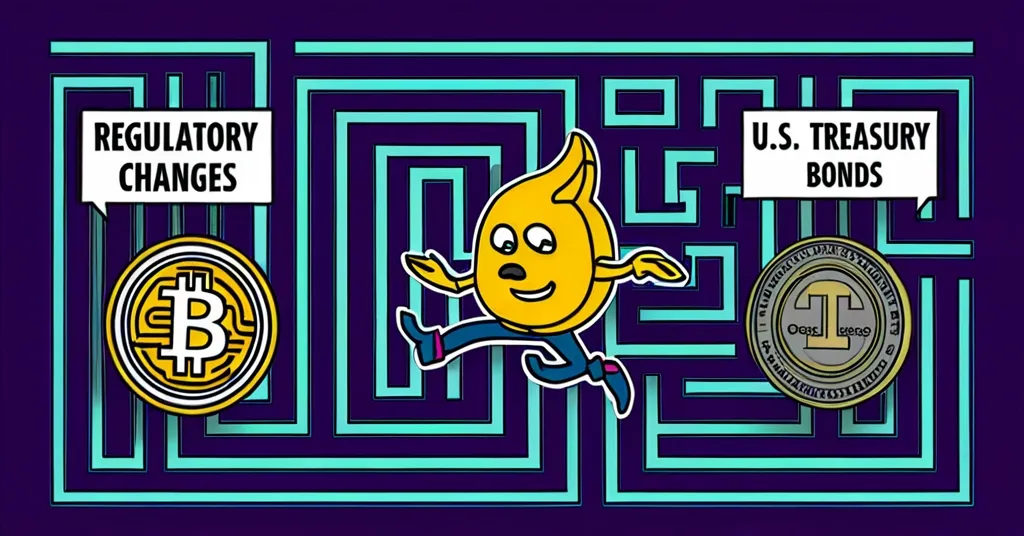Tether Faces Bitcoin Sell-Off Pressure Amid U.S. Regulatory Changes

Tether’s Regulatory Landscape: Navigating Potential Bitcoin Divestment
Tether, the powerhouse behind the USDT stablecoin, faces potential regulatory changes that may require it to sell its Bitcoin holdings, according to a JP Morgan analysis. Proposed U.S. stablecoin legislation aims to tighten reserve requirements, focusing on highly liquid assets like U.S. Treasuries. Tether disputes JP Morgan’s assessment, asserting its financial strength and readiness to adapt, while also relocating to El Salvador to engage with global regulators.
- Tether’s USDT leads in daily trading volume
- JP Morgan suggests potential Bitcoin divestment
- Proposed U.S. legislation targets reserve assets
- Tether relocates to El Salvador
With its USDT stablecoin, Tether holds a commanding position in the cryptocurrency market, ranking as the third-largest cryptocurrency by market cap and topping daily trading volumes at over $30 billion. However, JP Morgan analysts, led by Nikolaos Panigirtzoglou, have raised concerns that Tether may need to sell off its Bitcoin holdings to comply with proposed U.S. stablecoin legislation. These laws, such as the GENIUS Act and the STABLE Act, aim to enforce stricter reserve requirements, favoring highly liquid assets like government securities over cryptocurrencies like Bitcoin.
Reserve requirements refer to the assets Tether must hold to back each USDT token, ensuring stability and trust in the stablecoin. Highly liquid assets, like U.S. Treasuries, can be quickly converted to cash, providing the necessary liquidity to meet these requirements. JP Morgan’s report suggests that Tether may need to “implicitly replace its non-compliant assets with compliant assets,” which could mean divesting from Bitcoin.
Tether has responded with confidence, highlighting its robust financial position. With over $20 billion in liquid assets and quarterly profits exceeding $1 billion from U.S. Treasuries, Tether insists it is well-prepared to adapt to new regulations. A Tether spokesperson stated:
JP Morgan ‘does not understand either Bitcoin or Tether.’
In a humorous jab, Tether’s CEO Paolo Ardoino quipped:
JPM analysts are salty because they don’t own Bitcoin.
Despite these bold statements, Tether’s history includes regulatory scrutiny, leading to an agreement to cease operations in New York in 2021. In response to the evolving regulatory landscape, Tether has strategically relocated its headquarters from the British Virgin Islands to El Salvador, signaling its intent to engage with global regulators and maintain its market position.
Tether’s significant Bitcoin holdings, acquired since 2023 as part of its profit strategy, could have ripple effects on the broader crypto market if sold off to meet new reserve requirements. This potential shift from Bitcoin to U.S. Treasuries underscores the delicate balance between regulation and innovation in the crypto space. While Tether disputes the necessity of such a move, the possibility remains a topic of keen interest among crypto enthusiasts and market watchers alike.
Amidst these regulatory challenges, the cryptocurrency sector continues to innovate. The MIND of Pepe project, which blends meme culture with AI technology, exemplifies this spirit. Operating on the Ethereum blockchain, MIND of Pepe uses its $MIND token to engage the community and provide market insights. With a total supply of 100,000,101,001 tokens, the project emphasizes security, having undergone audits by Coinsult, which found no high-risk, medium-risk, or low-risk issues with its smart contract.
The regulatory landscape for stablecoins continues to evolve, with the proposed U.S. legislation still in its early stages. As Tether and other issuers navigate these changes, the crypto community remains hopeful for a balance between innovation and regulation that preserves the spirit of decentralization and financial freedom. For more detailed information on Tether’s regulatory environment, you can refer to Tether’s regulatory compliance.
Key Takeaways and Questions
- What is Tether’s position in the cryptocurrency market?
Tether is a prominent stablecoin issuer with its USDT product ranking as the third-largest cryptocurrency by market cap and leading in daily trading volume.
- What are the potential regulatory changes that could affect Tether?
Proposed U.S. stablecoin legislation might require Tether to sell Bitcoin and other non-compliant assets to meet new reserve requirements focused on highly liquid assets like U.S. Treasuries.
- How has Tether responded to JP Morgan’s analysis?
Tether disputes the analysis, highlighting its liquid assets and quarterly profits, and suggesting JP Morgan may be envious of its cryptocurrency exposure.
- What is the significance of Tether’s relocation to El Salvador?
Tether’s move to El Salvador signifies its strategy to navigate international regulatory challenges and engage with local regulators.
- What is MIND of Pepe and how does it operate?
MIND of Pepe is a cryptocurrency project that integrates meme culture with AI technology, using its $MIND token to engage the community and provide market insights.
- How does MIND of Pepe ensure security and transparency?
MIND of Pepe ensures security and transparency through audits by Coinsult and by making audit results publicly available.



